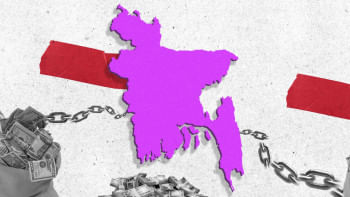Be careful with future external borrowing

The government needs to pay closer attention to the management of external sovereign debt, as in the upcoming budget, allocation to repay foreign debts may reach Tk 57,000 crore, a 53 percent rise from the current year. This will put further pressure on our dwindling foreign currency reserves, which also needs to be monitored closely. According to the finance ministry, allocation for foreign debt repayment has been Tk 37,076 crore in the current fiscal year. However, interest payments for increasing levels of foreign loans in recent years and the rapid devaluation of the taka against the US dollar have forced the government to set aside a greater amount for debt servicing.
Bangladesh's foreign debt service requirement has increased over the years, with the amount crossing the $1 billion-mark for the first time in 2012-13. In 2021-22, the amount went past $2 billion, and in the year after that, Bangladesh paid $2.67 billion in debt servicing. In the current fiscal year, it is going to cross the $3 billion-mark. Interest payments alone reached $1.05 billion in the first nine months of the fiscal year—crossing the $1 billion-mark for the first time. Given that Bangladesh's access to cheap loans is decreasing and foreign borrowing is also becoming costlier with its rising per capita income, debt servicing could become an issue in the coming years, unless the government takes a cautious approach.
According to the Economic Relations Division (ERD), Bangladesh is now having to borrow at the costlier market-based rates to cover its development spending. As the debt portfolio becomes increasingly dominated by market-based rates—and the volume of the payment becomes more dependent on the unpredictability of the global economy—the interest rate risk goes up. We have seen that happen recently, with the cost of foreign loans going up as interest rates shot up globally. With Bangladesh set to graduate from the group of least-developed countries, its share of concessional loans has drastically fallen. Alongside this, the grace period—when a borrower pays only the interest, rather than both interest and principal amounts—of some of its major loans will come to an end over the next few years. Therefore, the government needs to do some careful analysis of what the debt repayment situation will be in the near future.
The government will be well advised to accept any further loans based on careful calculations, as well as ensure the development projects it undertakes using foreign loans are truly beneficial. In that regard, the government has to do better in ensuring timely completion of development projects, as time extensions often lead to massive cost overruns. Additionally, it needs to ramp up its negotiation capacity and try to opt for more concessional loans over costlier options. And finally, it has to devise effective strategies to boost its foreign currency reserves via increased exports and remittance inflow.


 For all latest news, follow The Daily Star's Google News channel.
For all latest news, follow The Daily Star's Google News channel. 





Comments